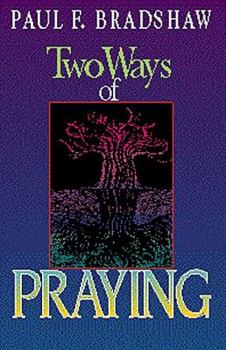Two Ways of Praying
Select Format
Select Condition 
Book Overview
Bradshaw attempts to reestablish the union of private and corporate prayer, arguing that for 200 years, mainly in North America, we have been divorcing our personal spiritual disciplines from those... This description may be from another edition of this product.
Format:Paperback
Language:English
ISBN:0687426677
ISBN13:9780687426676
Release Date:February 1995
Publisher:Abingdon Press
Length:140 Pages
Weight:0.50 lbs.
Dimensions:0.4" x 5.5" x 8.5"
Customer Reviews
3 ratings
Tremendously insightful analysis of prayer
Published by Thriftbooks.com User , 18 years ago
Modern worship warriors are often divided into two camps: those who value an emotional, experiential form of worship because it brings them closer to Jesus; and those who value objective, historical worship because it keeps them united with Christ through participation in the universal Church--the Body of Christ. Little did such worship warriors realize that these two competing values are actually 1700 years old--the Christian Church has always valued both emotional/idiosyncratic ("monastic") prayer and prayer that keeps them united with the universal church ("cathedral"). Unfortunately, the modern Christian has lost this distinction and the rich history associated with both forms. Paul Bradshaw, a professor of liturgy at the University of Notre Dame's Theology Department, makes a distinction between these two forms of spirituality and argues that the Church (as well as the individual Christian) needs to incorporate and balance both forms into their worship life. Doing such will create an "upward spiral" of spirituality. After comparing and contrasting "mostastic" and "cathedral" prayer, Bradshaw then shows how each may be incorporated in the worship life of a Church/Christian. Among the topics he covers are liturgy/worship; prayer with other Christians; the concept of the Body of Christ; the Psalms; public readings of Scripture; and private/family devotions. I cannot recommend "Two Ways of Praying" highly enough. This book is well written, covers an important (yet often neglected topic), his thesis is presented well, and he makes his thesis relevant to both the professional church worker and the lay Christian. Bradshaw has definately influenced both my prayer life and my understanding of prayer greatly and for the better.
Two Venues for Spirituality: Private Prayer & Communal Worship
Published by Thriftbooks.com User , 18 years ago
Practice of Prayer If prayer is a means of communication with God, it follows that much of our praying ought to involve listening for what God has to say. Although there are many ways to pray, the basic forms of prayer, corporate or personal, are essential means for spiritual life. The unique gift of the image of God in us, keeps our communication with God personal, yet our praise has always been a communal doxology. For sixty years, liturgical scholarship has alternately attempted to fit together pieces of evidence to suggest that a solid continuing line of evolution for the practice of early Christian worship that can be traced from the Jewish Christian Synagogue services in early apostolic age to the fourth century, when monastic types of prayer started to evolve in upper and lower Egypt. Roots of Christian prayer: Paul Bradshaw examines the historical roots of Christian prayer in the light of current New Testament studies, the ancient church tradition, and comparing these to recent developments in Jewish liturgical scholarship. He proposes a guidelines to Christian liturgical origins, adopting a more traditional approach, while acknowledging the limitations of our documented sources which describe the character of ancient Christian worship. While exploring those roots of Christian spiritual devotion, he attempts to search and confirm the unity of private and communal prayer in the early Church. As an Anglican priest, addressing westerners in the first place, he underlines the fact that in the last two centuries a divorce of personal prayer discipline and communal liturgical spirituality should be reintegrated, removing the barrier between those two worship experiences. Thematic Approach to Prayer: Bradshaw, who distinguishes, in a historical perspective, between Monastic and Cathedral approach to prayer, gives five fundamental distinctive differences between the two ways of praying. While exploring Christian traditions of prayer, recalled the ancient biblical root of using the psalms in worship, used by the Therapeutae and Essenes, an evident Jewish root for the evolution of monastic prayer. He thus helps to rejoin the two variants into a whole approach to a prayerful life. Meanwhile, he underlines New testament hymns as documented source for the historical development of liturgical prayer, in an effort in the liturgical renewal movement, PRAXIS. Revd Paul F. Bradshaw: Professor of Liturgy, University of Notre Dame in London, renowned liturgical scholar and a member of the Church of England Liturgical commission, is an Anglican priest-vicar at Westminster Abbey. Bradshaw's scholarly interests focus primarily on the history of Christian liturgy, and especially the period from its Jewish roots to the fourth century. He has written or edited more than twenty books and seventy articles. He is also coeditor of a series of volumes of essays on Jewish and Christian worship. Together with two of his doctoral associates, completed a compreh
Excellent survey of cathedral and monastic prayer
Published by Thriftbooks.com User , 23 years ago
This book should be required reading for anyone not appreciating their liturgical heritage. Bradshaw has written a readable, slim volume describing cathedral and monastic prayer - their appropriate use, history, the need for both in a full spiritual life ...Cathedral prayer is the communal prayer with fixed roles, use of external signs, etc. generally oriented towards the benefit of the world at large. Monastic prayer is the private prayer with temporary roles, external signs only as training devices, generally oriented towards the benefit of the one praying. This distinction derives from early church practices.Bradshaw shows that either practiced to the exclusion of the other is harmful - to the church and to the individual.Consider this an essential book for anyone interested in prayer, liturgy or spiritual direction.





